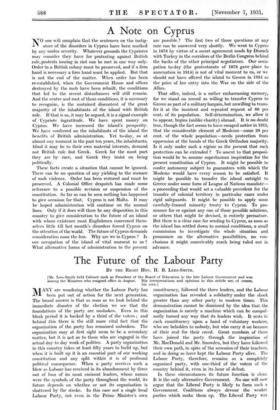A Note on Cyprus N O one will complain that the
sentences on the instig- ators of the disorders in Cyprus have been marked by any undue severity. Whatever grounds the Cypriotes may consider they have for protesting against British rule, protests issuing in riot can be met in one way only. Order in a British colony must be preserved, and if a firm hand is necessary a firm hand must be applied. But that is not the end of the matter. When order has been re-established, when the Government House and offices destroyed by the mob have been rebuilt, the conditions that led to the recent disturbances will still remain. And the centre and root of those conditions, it is necessary to recognize, is the sustained discontent of the great majority of the inhabitants of the island with British rule. If that is so, it may be argued, it is a signal example of Cypriote ingratitude. We have spent money on Cyprus. We have increased the island's prosperity. We have conferred on the inhabitants of the island the benefits of British administration. Yet to-day, as at almost any moment in the past ten years, the inhabitants, blind it may be to their own material interests, demand not British rule but Greek. Greek for the most part they are by race, and Greek they insist on being politically.
These facts create a situation that cannot be ignored. There can be no question of any yielding to the menace of mob violence. Order has been restored and must be preserved. A Colonial Office despatch has made some reference to a possible revision or suspension of the constitution. So far as can be seen nothing has happened to give occasion for that. Cyprus is not Malta. It may be hoped administration will continue on the normal lines. Only if it does will there be any disposition in this country to give consideration to the future of an island with whose existence most Englishmen concerned them- selves little till last month's disorders forced Cyprus on the attention of the world. The future of Cyprus demands consideration none the less. Why are we in Cyprus ? Is our occupation of the island of vital moment to us ? What alternative forms of administration to the present are possible ? The first two of those questions at any rate can be answered very shortly. We went to Cyprus in 1878 by virtue of a secret agreement made by Disraeli with Turkey in the corridors of the Berlin Congress behind the backs of the other principal negotiators. Our occu- pation to-day (the protectorate of 1878 gave place to annexation in 1914) is not of vital moment to us, or we should not have offered the island to Greece in 1915 as the price of her entry into the War on the side of the Allies.
That offer, indeed, is a rather embarrassing memory, for we stand on record as willing to transfer Cyprus to Greece as part of a military bargain, but unwilling to trans- fer it at the insistent and repeated request of 80 per cent. of its population. Self-determination, we allow it to appear, begins (unlike charity) abroad. It is no doubt true, though the fact seems to have escaped notice in 1915, that the considerable element of Moslems—some 20 per cent. of the whole population—needs protection from oppression at the hands of the Greek Orthodox majority. Is it only under such a regime as the present that such protection can be extended ? To assent to that proposi- tion would be to assume superhuman inspiration for the present constitution of Cyprus. It might be possible to confer autonomy subject to guarantees with which the Moslems would have every reason to be satisfied. It might be possible to transfer the island outright to Greece under some form of League of Nations mandate— a proceeding that would set a valuable precedent for the transfer of colonial territory in particular cases under rigid safeguards. It might be possible to apply some carefully-framed minority treaty to Cyprus. To pro- nounce for or against any one of those possible solutions, or others that might be devised, is entirely premature. But there is a clear case for sending to Cyprus, as soon as the island has settled down to normal conditions, a small commission to investigate the whole situation and pronounce on the alternative possibilities, no con- clusions it might conceivably reach being ruled out in advance.














































 Previous page
Previous page